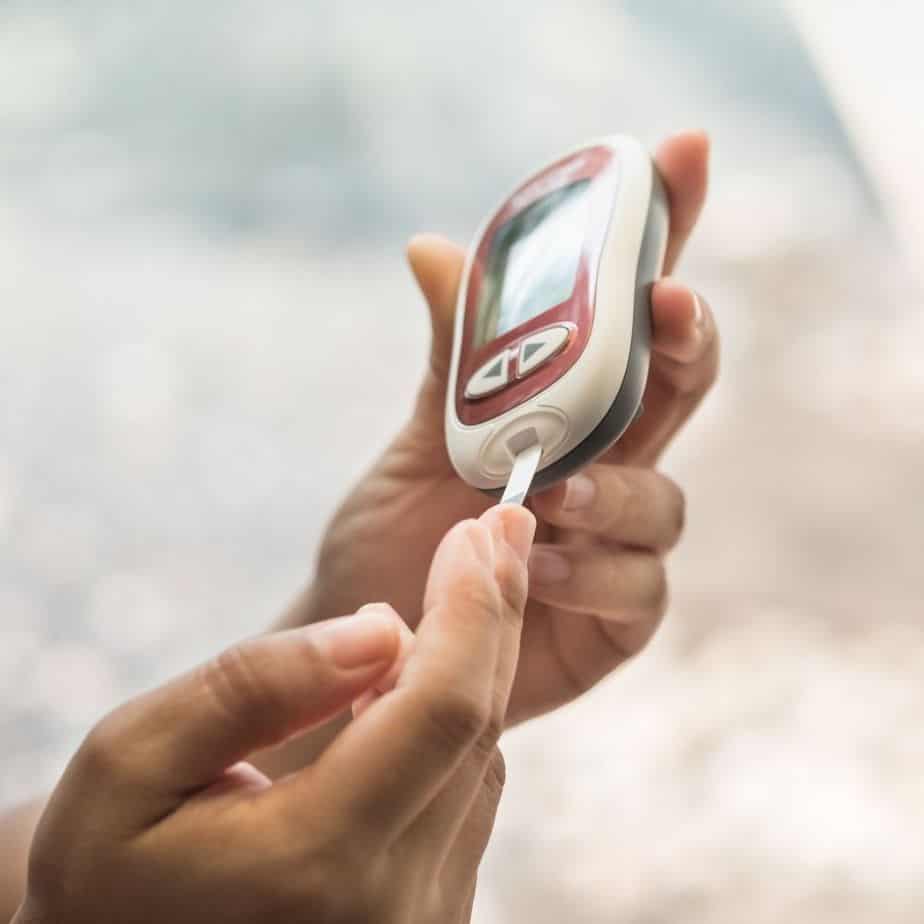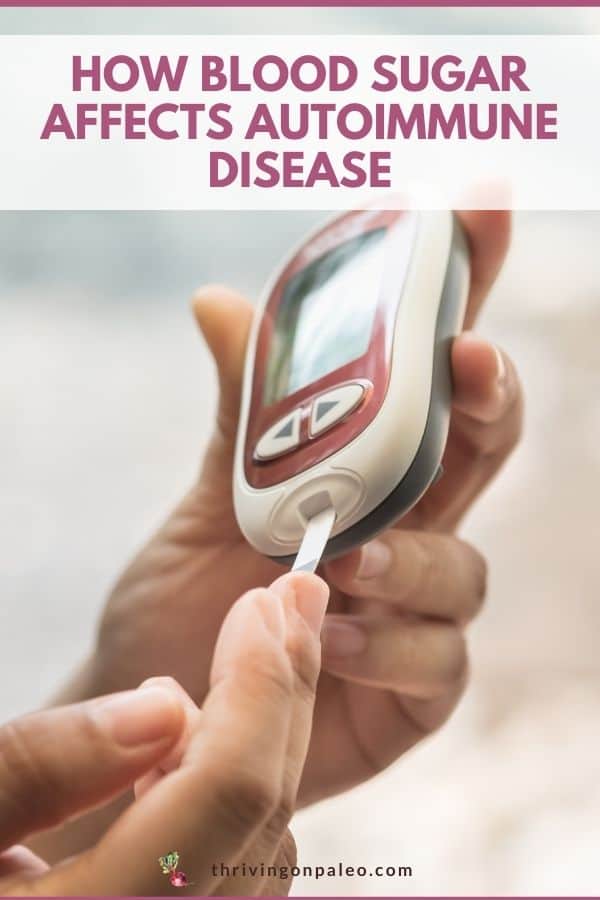This post may contain affiliate links. Please read my disclosure policy.
Do you know how much those carbs you eat are affecting you? It may just seem harmless, but if you're constantly eating excess – especially processed – carbs, you might be putting yourself in danger of not only Type 2 diabetes and the issues that come with that but ALSO flare-ups of your autoimmune disease! I didn't understand the extent of how much blood sugar control was important until this year and unfortunately think it negatively affected my health. So please read or watch the info below so you don't make the same mistake!!

If you’re a regular reader or YouTube viewer, you’ll know that my son Nathan got diagnosed with Type 1 Diabetes earlier this year.
In the process of learning to care for him, I’ve read countless books and watched hours upon hours of videos of doctors and researchers on both Type 1 and Type 2 Diabetes, blood sugar regulation, and insulin resistance, and I couldn’t help but notice how interconnected fluctuating blood sugar and autoimmune disease were.
I started out trying to help my son but learned so much about myself in the process.
So I wanted to break down and share this information with you as I really think it’s extremely important for anyone with an autoimmune disease to not only hear but understand if you want to not only feel better from your symptoms but CONTINUE to feel better long term. Ignoring this isn’t really an option, unfortunately – at least if you want to get better.
You can watch the video with this information here or read the info below!
The main players in blood sugar control
Glucose, or sugar, from carbohydrates, is the main source of energy for the body, at least for most people. There are other energy sources, like ketones, and our body’s ability to extract glucose from proteins and other sources, but for the scope of this video we’re going to be focusing on glucose from carbohydrates, as that is what most people eat.
Any sort of carbohydrate can be broken down into sugar. White sugar is obviously sugar, but even things like grains, sweet potatoes, or broccoli are turned into glucose the body can use. The exact amount of sugar from a carb source varies – the carbohydrate amount turned into glucose of whole grain bread, for example, is going to be a lot more than a cup of broccoli. But it all still looks like sugar in our bodies.
Glucose provides energy for our cells – the organs, muscles, and nervous system all depend on it. So when we eat carbohydrates, the food gets broken down and glucose from the food enters the bloodstream through the small intestine. At this point, you can call the glucose blood sugar, which is the amount of glucose in the blood – ready to be used by the cells for energy.
However, it’s not like the cells can just suck up this sugar and use it. Think of the cells at this point like a house with a locked door. The blood sugar is right outside the door but can’t get through without a key.
Insulin is the key
The key is insulin. This hormone is produced by the pancreas and its job is to unlock the “door” to the cells so they can use the glucose.
And then if there is excess blood sugar after the cells get their fill, insulin can convert that blood sugar to glycogen – which is a form of storage for glucose in both the liver and your muscles. This is a good thing – if you’re out and about and can’t eat, your body can turn that glycogen back into glucose for energy. But there is only so much storage space for glycogen, and once that’s filled, insulin will then shuttle the remaining blood sugar into fat cells for long-term storage.
Again, if something happens and you can’t eat for quite some time, this can be helpful as once you’ve used up your glycogen stores from your liver and muscles, you’ll be able to use the stores from fat for energy. This doesn’t happen too often though in our modern-day and age with food readily available – instead we keep flooding our bodies with excess glucose and our bodies have to keep releasing insulin to address it.
Unless you’ve been starved for a long time or are an athlete who works out a lot, it doesn’t take much to fill up your energy stores. One meal or even a snack could do it – and that’s only if you depleted your glycogen stores. If you’re eating on a regular basis and not working out a lot this may not happen regularly. So when you continue to eat high carbohydrate meals, your pancreas will continue to send out a surge of insulin to address the glucose you eat. And because your cells don’t need the energy and your glucose storage doesn’t need the energy, there is a ton of insulin in your bloodstream and your blood sugar levels may drop too LOW. This is called reactive hypoglycemia and can make you shaky, irritable, anxious, unfocused, hungry, and craving sugars and carb-rich foods – all of these things that the word “Hangry” describes.
Then because you have low blood sugar, you feel the need to eat ALL. THE. THINGS. and this starts the process all over again. You eat lots of carbs, raising your blood sugar, causing your body to send out a surge of insulin (which incidentally – ALSO makes you crave sugar…), causing you to go low again – over and over again.
Insulin Resistance
Now this whole process can eventually lead to insulin resistance – where the body no longer responds to the insulin in the same way. It basically ignores the insulin – kind of like if you were to sit near a busy road, at first you’d hear and may be bothered by the noise but after a while you probably wouldn’t even notice it. When you keep flooding your body with excess amounts of insulin the body just doesn’t notice it, so the pancreas has to keep pumping out more and more insulin to helps the cells “see it” and unlock the glucose for energy.
This in time can lead to Type 2 Diabetes, where the pancreas no longer can keep up with the amount of insulin needed to keep blood sugars in check and use the glucose for energy.
(A quick aside – in case you were wondering, Type 1 Diabetes, like what my son Nathan has, is where the beta cells in the pancreas were attacked via an autoimmune disease and therefore can no longer produce insulin. So he has to take an outside source of insulin in order to unlock the glucose he eats for energy. Without an outside source of insulin he’d die)
Why this is all so bad for autoimmune disease
Back to what happens when you keep eating high carbohydrate meals – yes, insulin resistance and Type 2 Diabetes are common problems from eating excess carbs and the resulting insulin surge. And neither of these are good things – not only will you gain weight, but it can cause a whole host of chronic health issues including heart attacks, stroke, blindness, nerve damage, and has even been linked to cancer and Alzheimer’s. That’s bad stuff – you don’t want those, so that’s enough reason right there to make sure your blood sugar is under control.
However – from an autoimmune disease standpoint it’s very important to pay attention to it well before it gets to that point.
Remember how I said if you eat a high carb meal, your blood sugar spikes, and then your pancreas floods your body with insulin and your blood sugars can drop quickly? Well, this is actually quite a big stressor on your body. You might be meditating all day long and feeling super calm, but if your blood sugar levels are constantly fluctuating, your body sees this as a constant, chronic stressor. When your blood sugars fluctuate wildly, your adrenal glands produce the stress hormone cortisol. This, in turn, can turn on the production of inflammatory proteins in the body. And then THAT can turn on a heightened immune response – which is exactly what you do NOT want when you’re trying to calm your immune system down and stop attacking itself.
Constant cortisol can also weaken the GI tract, making it more susceptible to inflammation, gut microbe imbalances, infection, and leaky gut – also very detrimental to feeling better from an autoimmune disease.
How it affects the thyroid – whether you have an autoimmune thyroid disorder or not
If you have a thyroid-related autoimmune disease like Hashimoto’s or Graves, chronic cortisol production is really bad news as it can prevent the hormone from converting from T4 to the active form of T3 that the body can actually use, prevent thyroid hormone from actually getting into cells by binding up the hormones before they can be used, and prevents the body from getting rid of excess thyroid hormones, eventually causing thyroid hormone resistance. Sound familiar? Yep – just like insulin resistance. There definitely can be too much of a good thing when it comes to the body and hormones.
These are some of the major reasons why even if you’re taking a thyroid hormone you might still have symptoms and/or wildly fluctuating levels of Thyroid Stimulating Hormone (TSH).
And if that weren’t enough, there even has been evidence to show that insulin surges can cause autoimmune tissue destruction of the thyroid if you have Hashimoto’s.
Even if you don’t have a thyroid-related autoimmune disease, you can even have thyroid issues from this as the adrenal, thyroid, and pituitary glands become exhausted trying to keep up with all of this cortisol production. So even if you don’t have Hashimoto’s or Grave’s, you might wind up with hypothyroidism if blood sugar is left unchecked.
In other words, you know stress is bad for you, but stress from unstable blood sugar is one of those silent stressors that can wreak havoc on your body.
The problem with constant high blood sugar
Now continued high blood sugars can also cause all sorts of autoimmune disease problems as well. Just like low blood sugars, high blood sugars, or hyperglycemia, can cause the same adrenal response pumping out cortisol and all that goes with that.
High blood sugar levels are also the leading cause of high testosterone in women, which can lead to things like Polycystic ovary syndrome (PCOS) and an imbalance of estrogen, which can lead to all sorts of hormonal imbalance issues like heavy and irregular periods, anxiety, bloating, inability to fall or stay asleep, and depression. If you have Hashimoto’s, these may sound familiar – but these symptoms may be exacerbated or even caused by the imbalances of these sex hormones rather than lack of thyroid hormone. It’s all interconnected (and complicated)!
One more interesting effect of chronic high blood sugar is leptin resistance. Leptin is yet another hormone that is produced in the fat cells of the body and its job is to tell the brain when you’ve had enough to eat. When you have a lot of body fat – remember, this is caused when insulin keeps shuttling excess glucose into fat cells for long term storage – you produce a lot of leptin. You can also produce a lot when you overconsume food, or even during fasting and extreme calorie-restrictive dieting. And when you produce too much leptin, the leptin receptors in the brain will shut down and not “hear” the message that you’re full and you should stop eating. Sense a common theme here of your body ignoring too much of a hormone? There’s definitely a delicate balance!
I bring leptin resistance up because (a) it might be a clue as to why you might not be losing – or gaining – weight and (b) because leptin also appears to be essential in regulating the immune system. In fact, leptin resistance has been considered a trigger of several autoimmune diseases as well – and get this – leptin resistance has been shown to increase insulin secretion and further cause insulin resistance. And then high insulin amounts cause more leptin to be produced! It’s a never ending cycle of bad news for your body if you’re trying to get or stay healthy.
Empty calories don’t give your immune system essential nutrients
And finally, not all carbs fall under this, but sugar specifically – whether it’s white sugar or any other form, is mainly empty calories. Typically it has no or very little nutrients and can take the place of foods that WILL give you essential nutrients. And your immune system is a nutrient hog – if it’s lacking in any nutrients the regulatory aspects don’t work well, letting autoimmunity run amock and destroying your organ tissues. So it really is important to make sure that when you take in calories, that they count

Ok phew – that was a LOT. There are other reasons why fluctuating blood sugar is bad, but I feel these are the most important and the biggest reasons why if you don’t address this, you may not feel better from your autoimmune disease symptoms and continue to get worse.
THE NEXT PART OF THIS SERIES: Want to know if YOUR blood sugars are fluctuating a lot? Read How to Know if Your Blood Sugar is Affecting Your Autoimmune Disease. That article is part 2 of this series!





Great video, very informative. Thank you
Thank you for enlightening us, as always. Another thought/connection here: I have read that there is an alarmingly rapid rise in non-obese, non-alcoholic fatty liver disease, much of it goes undiagnosed until there is a problem. I think this post helps to explain that as well.
Oh my stars! This is sooooooo fabulous! Everything I’ve been wanting to know about blood sugar, insulin, etc. in a way that I can understand it.
Thank you so much for this video – and for typing it out so that I can print it and study it. Can’t wait for the next video!
I’m so glad you’ve found value in it!
Thank you so much for this helpful video! I need to watch it again because you explain it so well, but, like you said, it is a lot to take in. I have Hashimoto’s and my mother has Hashi as well as type 2 diabetes and heart issues. I am borderline diabetic based on my A1C lab results, so I really needed to hear what you are saying! Thank you again.
You’re welcome! It definitely is a lot to take in. I had to “digest” it for a few months myself, haha. Just such a close link with Hashi’s and all this stuff unfortunately. Lucky us, right? ha!